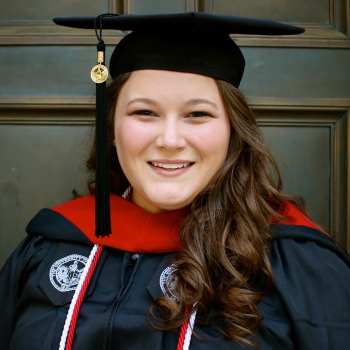Doctor of Philosophy (PhD) in
Nursing Science
Primarily Online
Program Overview
The Joint Nursing Science Ph.D. program is designed to prepare nurse scholars through collaborative work and inter-professional research. The goal is to produce trained thinkers with the ability to generate new theories and knowledge, conduct research and implement tactics to help rural and medically underserved populations. The program is a joint effort of The University of Alabama and The University of Alabama in Huntsville.
-
Program Format
Primarily Online -
Credit Hours
63 -
Tuition Per Hour
$434
Lead With Innovative Ideas in Health Care
The doctoral program focuses on developing nursing scholars who will be leaders in their field. Over the course of the program, students will demonstrate substantive knowledge of literature and theories about health care for rural and underserved populations; appraise models and theories from previously conducted research; design and conduct research that is sound and follows ethical and cultural guidelines; and disseminate research and new knowledge at national or international venues and in respected peer-reviewed journals. Graduates will be equipped with the knowledge and skills necessary to conduct research that can change lives through improving patient outcomes and reducing health disparities.
- Application DeadlineThe priority application deadline is Nov. 1. The application period closes on April 1 for summer admission.
- Required For EntranceRN Licensure Requirement
- Other Program SpecificsPart-time or full-time study is available
- Scholarships and Grants AvailableDiscover a range of scholarships and grants to support your educational journey
Curriculum
Enrolled students will be divided evenly between UA and UAH for administrative purposes. The program requires students to visit campus for three days in the summer semester each year for a mandatory intensive experience. BSN to Ph.D. students’ program will include three 1-hour seminars to support their transition into doctoral-level research.
Full-Time Program Study
Year 1
First Semester (6 credit hours)
- NUS 750 Philosophy of Science
- NUS 752 Informatics for Healthcare Terms and Scholarly Inquiry
Second Semester (9 credit hours)
- NUS 754 Ethical Conduct and Legal Issues in Research
- NUS 760 Statistics I (includes data management)
- NUS 764 Scientific Writing
Third Semester (9 credit hours)
- NUS 756 Application of Theoretical Models
- NUS 758 Quantitative Research Methods and Design
- NUS 762 Healthcare Policy for Rural and Medically Underserved Populations
Year 2
First Semester (6 credit hours)
- NUS 766 Epidemiology in Rural and Medically Underserved Populations
- NUS 772 Qualitative Research Methods
Second Semester (9 credit hours)
- NUS 768 Statistics II
- NUS 770 Grant Writing
- Cognate I*
Third Semester (6 credit hours)
- NUS 776 Advanced Research Methods
- Cognate II*
Maymester I
- NUS 798 Competency Assessment
Year 3
First Semester (9 credit hours)
- NUS 799 Dissertation
Second Semester (9 credit hours)
- NUS 799 Dissertation
Cognates*: All courses are three credit hours
- NUS 780 Omics Cognate I: Introduction to Omics
- NUS 781 Omics Cognate II: Omics and Nursing Research
- NUS 782 Nursing Education Cognate I: Curriculum Development and Program Evaluation for Nurse Educators
- NUS 783 Nursing Education Cognate II: Instructional Methods and Assessment in Nursing Education
- NUS 784 Nursing Technology Cognate I: Data Science & Emerging Technologies for Healthcare
- NUS 785 Nursing Technology Cognate II: Research and Development of Innovative Health Information Technology
Part-Time Study Program
Year 1
First Semester (6 credit hours)
- NUS 750 Philosophy of Science
- NUS 752 Informatics for Healthcare Terms and Scholarly Inquiry
Second Semester (6 credit hours)
- NUS 760 Statistics I (includes data management)
- NUS 764 Scientific Writing
Third Semester (6 credit hours)
- NUS 756 Application of Theoretical Models
- NUS 758 Quantitative Research Methods and Design
Year 2
First Semester (6 credit hours)
- NUS 766 Epidemiology in Rural and Medically Underserved Populations
- NUS 772 Qualitative Research Methods
Second Semester (6 credit hours)
- NUS 754 Ethical Conduct and Legal Issues in Research
- NUS 768 Statistics II
Third Semester (6 credit hours)
- NUS 762 Healthcare Policy for Rural and Medically Underserved Populations
Year 3
No classes in the First Semester (Summer)
Second Semester (6 credit hours)
- NUS 770 Grant Writing
- Cognate I*
Third Semester (3 credit hours)
- NUS 776 Advanced Research Methods
- Cognate II*
Maymester I
- NUS 798 Competency Assessment
Year 4
First Semester (6 credit hours)
- NUS 799 Dissertation
Second Semester (6 credit hours)
- NUS 799 Dissertation
Third Semester (6 credit hours)
- NUS 799 Dissertation
Cognates*: All courses are three credit hours
- NUS 780 Omics Cognate I: Introduction to Omics
- NUS 781 Omics Cognate II: Omics and Nursing Research
- NUS 782 Nursing Education Cognate I: Curriculum Development and Program Evaluation for Nurse Educators
- NUS 783 Nursing Education Cognate II: Instructional Methods and Assessment in Nursing Education
- NUS 784 Nursing Technology Cognate I: Data Science & Emerging Technologies for Healthcare
- NUS 785 Nursing Technology Cognate II: Research and Development of Innovative Health Information Technology
Admission
Entry is only available in the summer semester. Applications open on Sept. 10, and the priority application deadline is Nov. 1. All applications must be submitted by April 1 if enrollment is desired for that summer. Applicants must register for courses within two years of acceptance into the Joint Ph.D. Nursing Science program. All admissions are approved by the Joint Ph.D. Oversight Committee.
Requirements
- A minimum graduate Grade Point Average (GPA) of 3.0 on a 4.0 scale. Official transcripts must be sent to the University Graduate College.
- Resume or curriculum vitae.
- Three (3) letters of reference from professionals or professors who can adequately evaluate the applicant and the applicant’s previous work or potential for success. Two of the letters are strongly preferred to be by nurses with doctoral degrees.
- Scientific Writing Sample — This sample of your written work should demonstrate your intellectual ability (such as logic, critical thinking, analysis or synthesis) and your technical writing skills (composition, grammar, references, citations). For example, you could submit an academic paper, essay, published article or professional report written by you. If someone other than you contributed to this document (including editing), explain your contribution and the contributions of others.
- Statement of Purpose — In four double-spaced pages, respond to the following:
- Why do you want to pursue a Ph.D. in Nursing Science?
- What professional goals do you hope to achieve during and beyond your Ph.D. program?
- Describe prior experiences that have prepared you for doctoral study (e.g., research, presentations, publications, leadership roles in practice, education or professional organizations).
- What are your research interests?
- How might research in this area advance the science of nursing?
- R.N. Licensure Requirement —
- Applicants must have an active, unencumbered license as a Registered Nurse in the United States. Applicants holding equivalent certification or licensure outside of the U.S. will be considered case by case.
- Applicants who are not yet licensed will be considered for conditional admission, but proof of licensure must be submitted before completing 12 credit hours of Ph.D. coursework.
- Transfer applicants — Evidence of good academic standing at the current institution. Determination of whether credits may be transferred will be based on evaluating the comparability of the requested transfer course to the Ph.D. course and university policy and will be completed after admission.
- Interview: After reviewing the completed application and at the request of the Oversight Committee, applicants will be asked to do a personal consultation with the members. Research interests, professional involvement and motivation for completing doctoral study in the Ph.D. program will be assessed.
Official transcripts from each University or college attended must be sent to:
UAH Graduate Admissions
301 Sparkman Drive SSB, Suite 222
Huntsville, AL 35899
You will receive a written admission notification from the Deans of the Joint Ph.D. upon admission. You will also receive a letter from the graduate advisors at both UA and UAH outlining the requirements for entry into the Ph.D. program. Admission is contingent upon providing documentation of a background check and drug screen, and results being acceptable to the admission committee.
Contact Vickie Samuel at 205-348-8163 or vickie.bama@ua.edu regarding any additional questions about the application process.
Student Spotlight
Inspiring stories of success from students and alumni.
Take a look at some of our UA Online stories.
See All StoriesContact Us
Program Information
Sarah Hemphill
Admissions Representative
800-467-0227
sarahh.bama@ua.edu
Admissions Information
UA Online
800-467-0227
online@ua.edu













